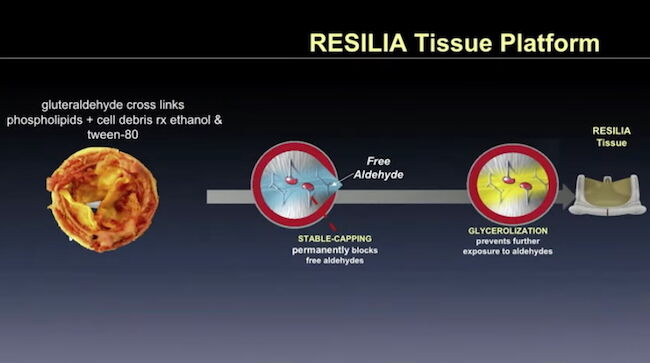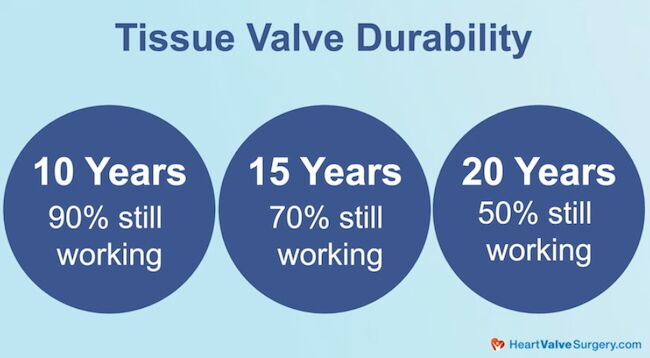Surgeon Insights: Tissue & Mechanical Heart Valve Replacement Durability
Written By: Allison DeMajistre, BSN, RN, CCRN
Medical Expert: Douglas Johnston, MD, Chief of Cardiac Surgery, Northwestern Medicine
Reviewed By: Adam Pick, Patient Advocate, Author & Website Founder
Published: August 14, 2025
Patients face numerous decisions when learning they need a heart valve replacement. Perhaps one of the most consequential decisions patients will make is whether to replace their diseased valve with a tissue or a mechanical valve. Although several factors must be considered before making a decision, including age, overall health, and lifestyle, there is no question that valve durability is one of the biggest patient concerns.
We get a lot of durability-related questions from our community. For example, Ravi just asked us, “Are there any new updates or research on what patients can do to enhance the durability of their heart valve replacement? I recently received an Edwards INSPIRIS RESILIA valve.” To answer Ravi’s question, we met with Dr. Doug Johnston, the Chief of Cardiac Surgery at Northwestern Medicine in Chicago, Illinois, who is a world-renowned expert in heart valve therapy.
Patient Considerations for Valve Replacement Durability
Here are the key insights shared by Dr. Johnston:
- There are two primary ways in which tissue valves can fail. “It’s a great question from Ravi and one patients often ask us,” said Dr. Johnston. “The truth is that there is not a lot you can do to make your valve last longer, or on the flip side, there’s not a lot you can do to screw it up. So, that’s the good news. All tissue valves typically fail one of two ways: either the leaflets tear, or more commonly, they develop calcification.”
- Modern generation valves are designed to last longer. “The specific valve you received, the RESILIA tissue treatment, is designed to reduce the rate of calcification over time. So, you have a modern generation valve. The hope is that it will last a very long time, but you don’t need to worry about anything you do in your daily life that might affect the durability.”

- How long do tissue valves last? Dr. Johnston said that the length of time tissue valves will last is very dependent on patient factors. “The most important one is age. For reasons we don’t fully understand, tissue valves tend to wear out more quickly in younger patients. It’s likely because the body’s metabolism of calcium is more active in younger patients. It may have a little to do with the immune system, but the younger you are, the faster the valve wears out.” Dr. Johnston explained that patients with a bicuspid aortic valve typically receive an aortic tissue replacement valve at around 50 or 60 years old, and they’ve found that these valves last about 15 years. “We know that, at least for the older generation pericardial valves, at 10 years, more than 90 percent of them are still working. At 15 years it’s about 70 percent, and by 20 years it’s down to 50 percent, which is not too bad for a prior generation valve.”

- Patients often ask the same question about the durability of mechanical valves. “Theoretically, a mechanical valve can last a human lifetime,” said Dr. Johnston. “The machine is amazing. The question is, how well is it maintained? I often tell patients it’s sort of like a high-priced sports car, like it needs a lot of maintenance to work well. If patients take their anticoagulation, their Coumadin, and regulate their dosing well, a mechanical valve can last 40 plus years. I’ve taken out mechanical valves that are as old as 45 years. The maintenance is very important, though. Before choosing a mechanical valve, I always discuss it with patients and let them know that it is a lifelong decision they must make. They need to look in the mirror and ask themselves if this is something they’re willing to take care of for the rest of their life. If they are, it’s a great choice.”
Thanks Dr. Johnston and Northwestern Medicine!
On behalf of all the patients in our community, thank you, Dr. Douglas Johnston, for everything you and your team are doing at Northwestern Medicine in Chicago, Illinois!
Related links:
- Survival Rates of Minimally-Invasive vs. Sternotomy with Dr. Doug Johnston
- Ask Dr. Johnston: How to Avoid Bacterial Endocarditis Infection at the Dentist?
- See Patient Reviews for Dr. Doug Johnston
Keep on tickin,
Adam
P.S. For the deaf and hard-of-hearing members of our patient community, we have provided a written transcript of our interview with Dr. Johnston below.
Video Transcript:
Adam Pick: Hi, everybody. It’s Adam with HeartValveSurgery.com and we’re in Los Angeles, California at the Society of Thoracic Surgeons Conference. I am thrilled to be joined by Dr. Doug Johnston, who is the chief of cardiac surgery at Northwestern Medicine in Chicago, Illinois. Dr. Johnson, it is great to see you again, and thanks for being with me.
Dr. Doug Johnston: Great to see you, Adam. Great to be here.
Adam Pick: We’re here at STS learning a lot of new information. Some great studies are coming out in research. We’re also getting patient questions. This one came in from Ravi, and Ravi asks, “Are there any new updates or research on what patients can do to enhance the durability of their heart valve replacement? I recently received an Edwards Inspiris Resilia.”
Dr. Doug Johnston: Well, that’s a great question from Ravi. It’s a question patients often ask us. The truth is that there’s not a lot you can do to make your valve last longer, or the flip side is there’s not a lot you can do to screw it up. So that’s the good news. These valves, all tissue valves typically fail one of two ways, either the leaflets tear or more commonly they develop calcification.
The specific valve you received, the Resilia tissue treatment is designed to reduce the rate of calcification over time. So, you have a valve that is a very modern generation valve. The hope is that that valve is going to last a very long time, but you don’t need to worry about anything you do in your daily life that might affect the durability.
Adam Pick: Great. I got a follow up for you, Dr. Johnson. I get this question about 10 times a week. How long do tissue valves, last? And maybe you can touch on mechanicals as well.
Dr. Doug Johnston: Sure. So, uh, great question. How long they last is very dependent on patient factors. The most important one is age.
Tissue valves wear out faster in younger patients. For reasons we don’t understand very well, it’s likely to do with the fact that the body’s metabolism of calcium is more active in younger patients. May have to do a little bit with the immune system, but the younger you are, the faster the valve wears out.
Patients who are in their 50s and 60s, the most common age for patients to get a tissue aortic valve, um, typically because of bicuspid valve disease. We know that at least for the older generation, uh, pericardial valves, at 10 years, more than 90 percent of them are still working. 15 years. It’s about 70%.
And by 20 years, it’s down to 50 50, which is actually not too bad for a prior generation valve. So a fair number of patients will go at least 15 years.
Dr. Johnston: So patients often ask the same question about mechanical valves, and theoretically, a mechanical valve can last a human lifetime. The machine is amazing. The question is, how well is it maintained? I often tell patients it’s sort of like a high priced sports car, like it needs a lot of maintenance to work well.
So if patients take their anticoagulation, their Coumadin. Um, and regulate their dosing well, a mechanical valve can last 40 plus years and I’ve taken out mechanical valves that are as old as 45 years. The maintenance is very important though. Before choosing a mechanical valve, I would always talk to patients and say, look, this is a lifelong choice you got to make.
So, look in the mirror and say, is this something I’m willing to take care of for the rest of my life? If you are, it’s a great choice.
Adam Pick: Great. Well, Ravi, I hope that helped you. I know it helped me. And Dr. Johnson, as always, thanks for everything you and your team are doing at Northwestern Medicine in Chicago.
Thanks for being with me today.
Dr. Doug Johnston: Thanks, Adam.




